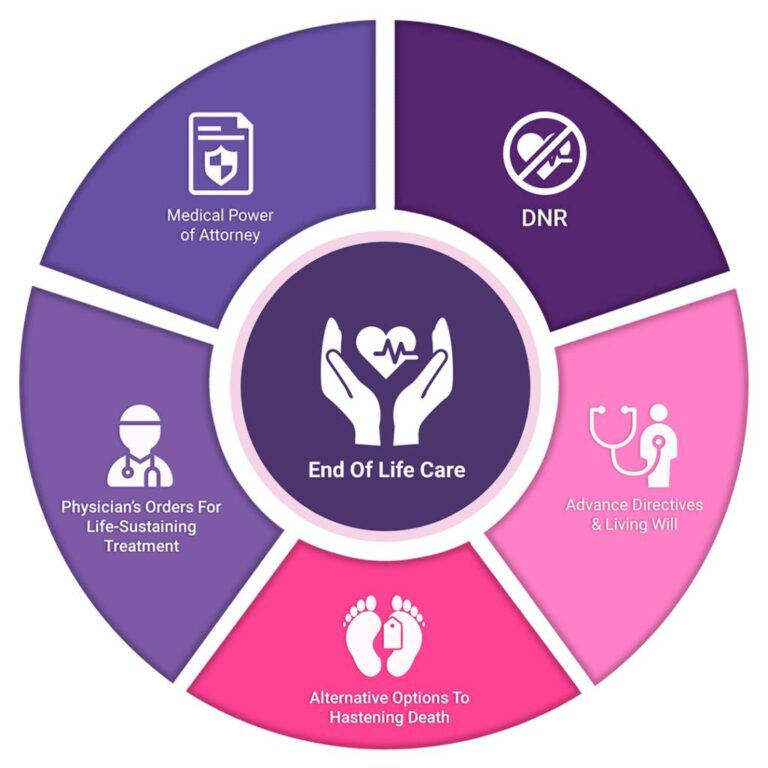End Of Life Care Planning
End-of-life care planning is an advanced care plan to support patients and their families in the last years, months, weeks, or days of their lives.
It is a tremendous gift by the patient to their family and is more remarkable and precious, as this will be their last gift for their loved ones. This plan can help them in finding peace at the time of crisis.
Families can spend good quality time rather than worrying about doing things and making callous decisions. In simpler words, end of life care planning is the process of thinking, talking and writing down your future health care preferences and values which helps you to live fully as much as possible until you die. It provides you with a meaningful end-of-life stage by knowing that your wishes and decisions have been noted and will be honored when the time comes.
Acceptance of reality is the only way to live a contented life. Nobody can escape from death; it has to come no matter how much we try to get rid of it. Denying or running away from death or any prolonged illness is of no use. Instead, we need to plan how comfortably and with dignity we want to leave this world because, ultimately, this day has to come, and we must be ready to face reality and plan accordingly.
End-of-life care planning can be achieved in several ways, which includes:
- Conversations between the families and patients.
- Using written advance directives that document the wishes of the patients.
- Surrogate decision-makers who participate in representing the wishes, demands and preferences of the patient.
- Discuss with your physician about your concerns and make them aware of your decision to get palliative care.

What Is Palliative Care?

Palliative care is a medical speciality that focuses on assisting patients and families confronting serious diseases in order to achieve the best possible quality of life. The diagnosis of a condition initiates palliative care. It continues to provide the care necessary for relief from disease symptoms. Some patients recover and move out of the care. Whereas, some chronic diseases may move in and move out of palliative care as the need arises.
The service of palliative care is not only confined to patients only but also extends to the patient’s loved ones and caregivers. They believe in educating them about the patient’s disease, treatment plan and medications. They also believe in respiting care for the caregivers. This approach is called holistic because it not only believes in dealing with the disease and its system but also as a person who needs full attention in every aspect of his life from physical to mental discomforts.
Who Provides End-Of-Life Care?

A whole team is involved and is called the Inter-Disciplinary Team (IDT),which manages end-of-life care planning and provides palliative care. In IDT, health professionals work together with different areas of expertise to provide the physical, psychological, emotional and spiritual needs. The team includes physicians, nurses, certified nursing aides, social workers, chaplains, counselors, physiotherapists and volunteers. However, it depends where the patient wants to be taken care of, at home or in a care home.+
When Does End-Of-Life Care Start?

If you think only the old aged people and those suffering from life-threatening diseases need to seek end-of-life care planning, then that’s not the case. Healthy and young people should also plan for their end days before time. We all know life is very unpredictable, and we can never be sure how long we will stay fit as a fiddle. Therefore, planning ahead can be beneficial to voice your wishes to your family about your decisions and the type of care you want for yourself in the last days of your life.
It depends entirely on your needs when to begin your end-of-life care plan and it varies from a few days or for weeks, months, or years. Generally, people are liable to such a plan when reaching the end of their lives and are expected to die within a year. There are several conditions in which death is approaching soon, like neurodegenerative disease, cancers, ischemic heart disease, AIDS, stroke, tuberculosis and chronic obstructive pulmonary disease as well as renal failure among many others. Moreover, sudden life-threatening road traffic accidents (RTA) or any catastrophic event can also lead to unexpected disability or trauma.
If you are reaching the last days of your life, you or your trusted family member must contact your physician to provide you and connect you with a planned services provider.
Having A Conversation About The End Of Life

Before making any decisions, you need to sit and ask yourself what good life means to you, how you want your final year to look like and your concerns and fears related to your health and family. Once you have all your answers with you, now it’s time to have a heart-to-heart conversation with your loved ones. It is preferable to have this chat when things are going smoothly and there is no time of crisis. It would be best to convey all your worries to them and explain how you’d like to live and leave the world.
You can document your goals and preferences for your future care and share them with your family. Then nominate a spokesperson for yourself who knows you well and who you trust, will speak up for your wishes and values. This will make your loved ones deal with the hard decisions knowing that how you feel and want. Furthermore, the control of your life decisions will still be in your hand.
Why Do You Need To Plan Before Time?

Planning is a significant move ensuring you have control over the foreseeable issues that may come along with your illness or after your death. You have made your decisions and choices on time and have not left things up to chance and over somebody else to make decisions for you. Imagine that you have become incapacitated and cannot speak up for yourself and you are watching others make decisions for your life. Maybe you never wanted to get a Naso-gastric tube for feeding but your family has allowed the health professionals and you have no control to stop them. Because unfortunately, your ill medical condition doesn’t let you take things in your control anymore and speak for yourself.
But suppose you have already chosen end of life care planning. In that case, your health care professionals can plan your future caretaking your preferences into account, giving you a peace of mind. It will bring less anxiety and depression to you and your family. You will not be making your family’s life difficult with your illness and nobody is being forced to take care of you. You already have a healthcare professional team to deal with your problems. Hence, the planning can lower the burden of medical care and bring your family close to you in the last days of your life and offer you quality time together.
Living Wills & Advance Directives

If you are ever incapacitated and can no longer communicate, living will be advantageous to you to give out all your necessary wishes, instructions and convey your decisions. This document can specify what treatments you want and what treatments you don’t want if you have lost consciousness or are unable to make your own decisions. You create a living will without the help or sign-off from your physician, but when you have chosen an end-of-life care plan, it must be signed by your physician too. The will has to be witnessed by two individuals who must be 18 years or above and it is only effective if you have been determined terminally ill by at least two physicians.
A living will outline your wishes about medical treatments, which are life-prolonging. It can cover many life-sustaining therapies and treatments, including blood transfusions, medications, insertion of feeding tubes, breathing machines, dialysis and more.
What Role Does Hospice Play?

Hospice is not only a place for addressing your end-of-life care plan but is a philosophy of care. It is specially designed to meet the specific needs of patients and families when they are no longer seeking a cure for a life-threatening illness. It gives stability to them as they are going through the different complex of emotional, social, physical and spiritual phases of life.
A hospice deals in the most ideal way with the help of IDT, having well-trained health professionals to optimize care at every stage. They give a close review at every step. Undoubtedly, hospice provides a team with which you can not establish on your own. If you are taking home service, the team will coordinate regular nursing visits. They also assist with personal care like bathing, feeding, repositioning etc. They even offer durable medical equipment like nebulizers, walkers, hospital beds, etc.
The burden of medical care is reduced by a hospice so that patients and their families can focus on what matters more i.e. their time together. Hospice even guides you through your expected and unexpected issues. It even has social workers who work as advocates and legal advisors to educate them for financial strains, job-related problems, insurance policies and legal problems.
The majority of us don’t even want to talk about death; it’s scary and taboo for us. In this regard, hospice is extremely useful to keep us highly informed about the end of life and dealing with all our problems and concerns, making patients and families be at their ease and prepared for the life laid ahead.
However, hospice and palliative care both serve the purpose of providing comfort to the patient and families but palliative differs in the regard that it begins at the time of diagnosis and continues till the time of recovery. While hospice care starts once the illness has worsened and the patient is no more on track of healing. It confirms that the patient will no longer be able to survive and his death is nearly expected.
Do You Have To Sign A DNR?

You will have to get acquainted with several medical and legal terms once you have opted for end-of-life care planning. One of them is the Do Not Resuscitate (DNR) document that a hospice asks you to sign if you do not want any artificial breathing equipment i.e. a ventilator, in case of emergency of cardiac arrest or respiratory arrest.
DNR differs from the living will and medical power of attorney because a patient or attendant needs the physician’s approval to have a DNR order. You and the physician must sign it to make this document valid.
Facing Challenges In Pediatric End-Of-Life Care

The innocent terminally ill children are the most challenging group to be taken care of. Dying at a young age is not easy to be tackled by the children and their parents. For them, going through this process is devastating. Sometimes, they don’t share their pain stimulations because they are afraid of getting injected or taking medications, including bitter syrups and tablets.
The pediatric treatment plan mostly followed is the curative approach to try their best to save those little angels. This creates a drawback; less attention is paid to the symptomatic treatment for the children. However, the communication gap can not be ignored between the children and healthcare professionals. Some of them are so young that they can’t even speak or share that how are they feeling.
How To Get Connected With End-Of-Life Care Planning?

Once you have made up your mind to have a future care plan for the end of your life, you need to gather all your wishes and preferences that you want to fulfill during the last days of your life or after your death. No doubt, it is heart-reckoning for the family to bear the loss of their loved one and nothing can fill that void.
But your plan will surely depict your love and affection for your family. It’s a far-sighted move to have this conversation with your family, making them aware of your choices and decisions and create a documented form of all your preferences. The next stage would be having a word with your physician and asking them to help you and connect you to the best hospice available.

